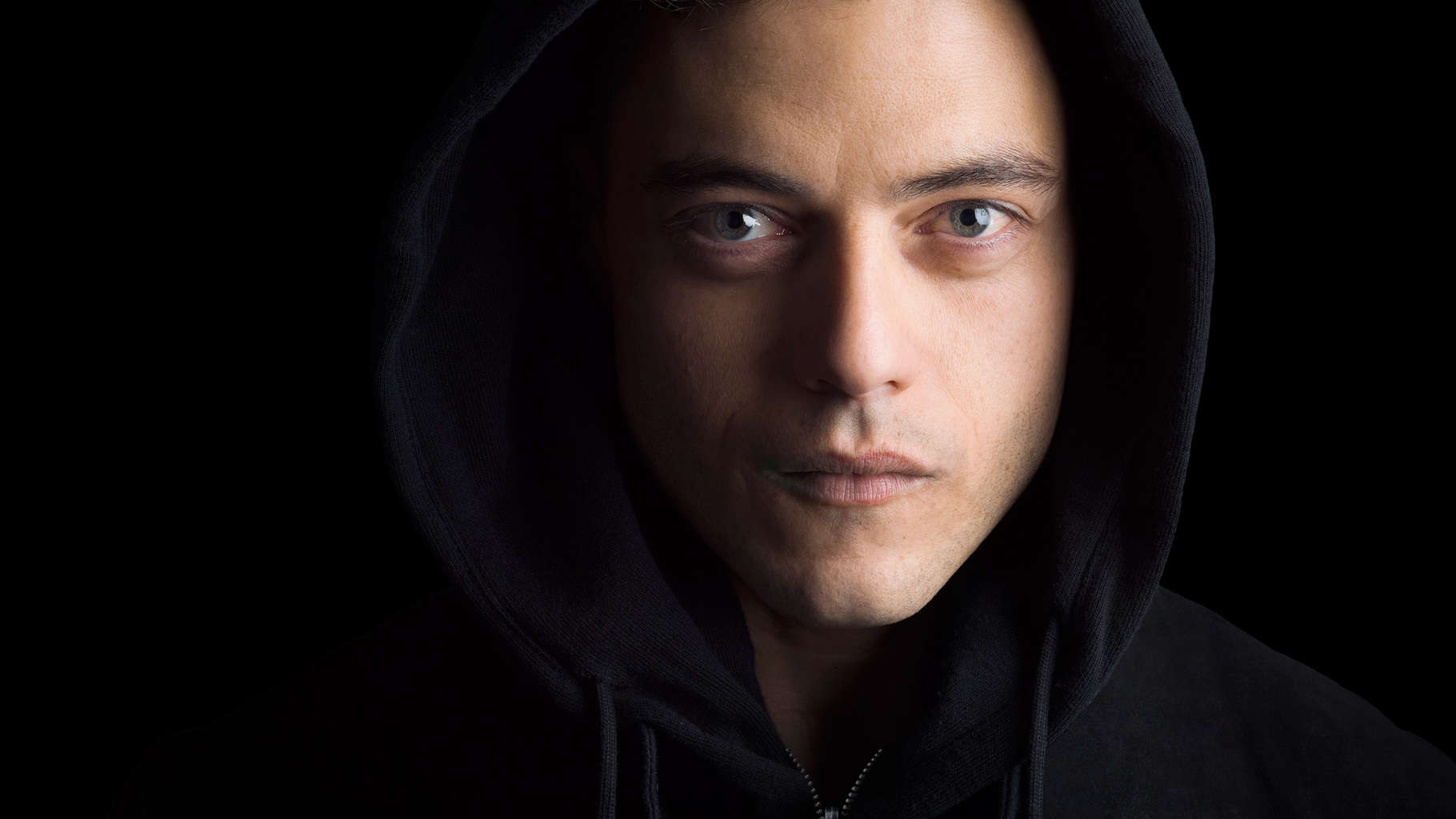Review: Mr. Robot (1.01)

Line of the Week: “What do normal people do when they get this sad?”
In the current pop culture landscape, there seems to be no shortage of brilliant yet abrasive male characters who have a difficult time interacting with the rest of society, be it via deliberately combative snark, unrestrained quirks, or some combination of the two. It’s a difficult trope to pull off writing-wise, especially if the protagonist’s mode of interacting with the world crosses the line from entertaining disdain to unfounded cruelty, resulting in a so-called hero that seems entirely too toxic and frustrating to appreciate. This makes it all the more unexpected and delightful when a show nails the portrayal of a compelling protagonist who’s both isolated and relatable. The pilot of Mr. Robot is one such success story, supported by a fascinating script and a nuanced performance from Rami Malek.
At first glance, gifted hacker Elliot seems like one of television’s usual scornful geniuses, compelled to do good works while maintaining a steady stream of misanthropic commentary. He has all of one friend, a therapist he lies to, and a workplace catering to people he despises. In between acts of vigilante justice, he secretly hacks into the online profiles of everyone he knows, analyzes their worth as human beings accordingly, and, if he likes them enough, takes it upon himself to personally solve their problems (i.e. ordering the aforementioned therapist’s cheating boyfriend to break up with her). Elliot gets up to some profoundly morally ambiguous stuff, and his general lack of respect for boundaries, combined with his need to rescue the few individuals he cares for, can come off as paternalistic. However, a closer look at the character reveals there’s some truly unique and pleasantly surprising writing under the recognizable surface qualities. For starters, Elliot isn’t simply cut off from others due to an advanced intellect and a superiority complex: he’s legitimately mentally ill. And it’s not portrayed as cool, or funny, or something that makes him inherently more talented and special than everyone else. It just makes him alone, and he hates that.
How often does this happen on television? How regularly do we get a character whose pathos and struggles are rooted in depression and anxiety, something a portion of the audience can actually relate to in everyday life? Seeing Elliot unable to go to his best friend Angela’s birthday party out of sheer crippling shyness is amazingly honest and affecting for its simplicity. He isn’t alone because he’d rather mock people than befriend them; he’s just too overwhelmed, sick
with insecurities and pain regardless of how he wishes he could act around others. Elliot is smart and witty and contemptuous of society, sure, but he’s also vulnerable. Sometimes, in the middle of trying to invent the most offbeat and exceptional heroes possible, we forget to ground them in sympathetic frailties; as an uncommon take on a familiar idea, Elliot’s most human traits are more interesting than his intentionally cool and hype-able abilities. I don’t know many vigilante computer hackers (you could go so far as to say that I know none), but I do know people who’ve felt sad and alienated and nigh-incapable of making friends at one time or another.
It only gets better when the pilot’s script plays Elliot’s disconnectedness out through innovative narrative means. The audience is treated to a voiceover justified with the in-universe function of Elliot offering commentary to an imaginary friend; this goes hand-in-hand with the story being filtered entirely through his perspective. When he tells us he converts major conglomerate E Corp’s name to “Evil Corp” every time he sees or hears it, other characters proceed to refer to it that way as well. It’s so seamless that, the first time I watched the episode, I thought Elliot’s coworkers sarcastically used the nickname alongside him; only later did I pick up on the writing’s deliberate attempt to totally immerse us in his viewpoint. It also sets up the idea that, even though Elliot is relatable to us, we can’t entirely trust him. He closes the pilot with a plea to his imaginary friend/the viewers: “Please tell me you’re seeing this too.” It creates a weird, complicated dynamic where the only person he lets himself depend on isn’t actually real to him, and Elliot is starting to wonder how many of his experiences can even be trusted as “reality.” It also loops back to that aforementioned vulnerability; he’s begging his own made-up confidante to verify everything he witnesses as he falls down the rabbit hole.
So where does all this quiet desperation and unreliable narration leave us? Just as Elliot’s most basic expressions of
loneliness and need are where the episode shines, the brief scenes expressing love, sincerity, and an earnest effort to connect supply its true payoff. Elliot’s “no touching thing” is briefly emphasized a few times – he’ll shy away from physical contact, suppress the desire to flinch – so his hug with Angela after she tells him to stop fighting her battles for her comes as a surprisingly cathartic and sweet moment. In an instance of remarkable subtlety, Elliot sets aside his personal discomfort to reassure her. While he spends most of the episode theoretically helping others, this feels like the truest act of selflessness we see from him. It exemplifies how this show’s most restrained gestures speak the loudest thematically.
Mr. Robot goes live on USA Network at 10/9c starting June 24th. With a second season confirmed already, I can’t wait to see the psychological twists and turns we’ll no doubt encounter as Elliot goes deeper into the corporate conspiracies surrounding him.